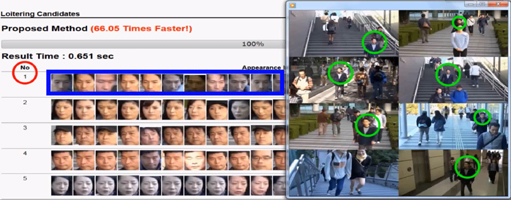This is the repository to host the dataset used in the AntiLoiter paper that was published at ACM Multimedia 2016 [2].
The dataset is created from a synthetic surveillance dataset. The scene contains eight cameras, each with a 1920x1080 resolution. The footage shows actors moving across the area. They do not stop, turn around, or change their trajectory. One of the actors acts like a loiterer. While the actor does not stop or show an unusual trajectory, they repeatedly appear on the different cameras. From this scene, facial features were extracted. These facial features were then grouped together using the Luigi indexing method descibed in [1,2], and the visualized result of the loitering discovery system described in [3]. This dataset contains the metadata of these features.
The dataset is a .txt file. Each line contains the metadata of one facial feature Groups of facial features are seperated with a dash -
Each feature has the following format:
UniqueID CameraID BeginTimestamp FrameID FrameRate Left Top Right Bottom
Example:
9310 3 1446038202 2142 29.970 567 320 643 412
- UniqueID: Unique identifier of the feature.
- CameraID: Identifier of the camera the feature was extracted from
- BeginTimestamp: Timestamp of start of the video footage (Unix Epoch time)
- FrameID: Number of frames since the start of the video footage
- FrameRate: Frame rate of the video camera
- Left: Bounding box top left X coordinate of the feature
- Top: Bounding box top left Y coordinate of the feature
- Right: Bounding box bottom right X coordinate of the feature
- Bottom: Bounding box bottom right Y coordinate of the feature
The timestamp of a feature can be calculated as follows:
BeginTimeStamp + (FrameID / FrameRate)
The center of a feature can be calculated as follows:
Center X = Left + (Right - Left) / 2
Center Y = Top + (Bottom - Top) / 2
Here is a tiny sample of the dataset.
If you want to use this dataset, please contact j-liu (AT) ct.jp.nec.com. When using this dataset, please cite the following two publications:
@article{LiuNAN17,
author = {Jianquan Liu and
Shoji Nishimura and
Takuya Araki and
Yuichi Nakamura},
title = {A Loitering Discovery System Using Efficient Similarity Search Based
on Similarity Hierarchy},
journal = {{IEICE} Transactions},
volume = {100-A},
number = {2},
pages = {367--375},
year = {2017},
url = {http://search.ieice.org/bin/summary.php?id=e100-a_2_367}
}
@inproceedings{LiuNA16,
author = {Jianquan Liu and
Shoji Nishimura and
Takuya Araki},
title = {AntiLoiter: {A} Loitering Discovery System for Longtime Videos across
Multiple Surveillance Cameras},
booktitle = {Proceedings of the 2016 {ACM} Conference on Multimedia Conference,
{MM} 2016, Amsterdam, The Netherlands, October 15-19, 2016},
pages = {675--679},
year = {2016},
url = {http://doi.acm.org/10.1145/2964284.2970927},
doi = {10.1145/2964284.2970927}
}
This dataset is only allowed to use for academic research without any commercial purpose. All copyrights are reserved by the authors and original providers. This dataset is available on request to the authors of the following publications.
-
Jianquan Liu, Shoji Nishimura, Takuya Araki, and Yuichi Nakamura. A loitering discovery system using efficient similarity search based on similarity hierarchy. IEICE Transactions on Fundamentals of Electronics, Communications and Computer Sciences, 100-A(2):367–375, 2017.
-
Jianquan Liu, Shoji Nishimura, and Takuya Araki. Antiloiter: A loitering discovery system for longtime videos across multiple surveillance cameras. In Proceedings of the 24th ACM International Conference on Multimedia (ACM Multimedia), Amsterdam, Netherlands, October 15-19, pages 675–679, 2016.
-
Jianquan Liu, Shoji Nishimura, and Takuya Araki. Visloiter: a system to visualize loiterers discovered from surveillance videos. In Proceedings of the 43rd ACM SIGGRAPH Conference on Computer Graphics and Interactive Techniques (SIGGRAPH), Anaheim, CA, USA, July 24-28, page 47, 2016. Posters.
